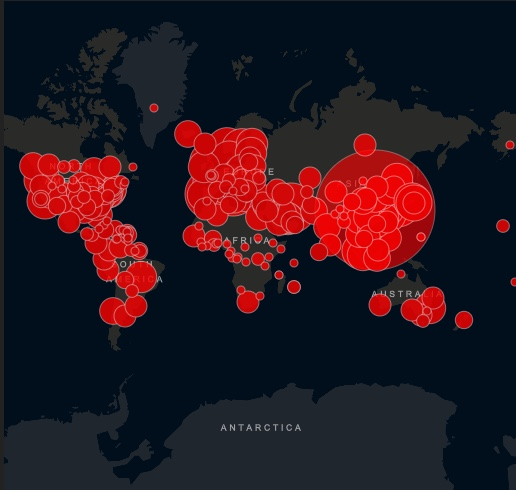While countries are tilting towards containment, while health services are often overwhelmed, while a whole series of shortages (masks, tests, artificial respirators) are being measured, while schools are tilting towards distance learning, communities of developers, companies, states (as in Germany) have undertaken to call upon collective intelligence to identify the main challenges and imagine solutions: in Finland, in Germany (with 40,000 participants), Colombia (Hackaton para buscar soluciones), Lithuania (HackTheCrisis) or in Belgium, this weekend.
These calls to mobilize developers and makers to imagine solutions take various forms: competitions around a well-identified thematic challenge, or more open, cross-disciplinary hackathons that explore a wide variety of challenges.
This week, WHO is taking the initiative for a global hackathon: #BuildforCOVID19
Hacking Covid-19: an online hackathon to equip healthcare professionals (France)
Health Factory (the originator of the Hacking Health Camp in Strasbourg) is organizing a Hacking Covid-19 to " create digital tools that will help healthcare professionals in their fight against the coronavirus". "Healthcare professionals are already submitting problems to us, and we are offering you the opportunity to join a project team and help rapidly prototype solutions. Let's take advantage of the containment to contribute to solving problems related to the management of the coronavirus, in the form of an online hackathon".36 challenges have already been identified. These include
- A kind of Wikipedia covid - Interface gathering off-the-record infosses proposing effective and natural remedies from reliable sources
- Immediately detect the person if he or she is likely to have the symtoms of this virus
- Use of 3D printing for the design and production of modular, reusable and recyclable medical protection equipment.
- Database of available and willing caregivers
- Application for monitoring the progress of COVID-19, patients at home and people at risk with dashboard and multilingual
- Collect quality scientific literature on COVID-19 to adapt practices
- List and adapt in real time the medical protocols for the management of patients with COVID-19.
- Use of ARS Grand-Est data to anticipate health needs
- A volunteer hotline to assist general practitioners (GPs) not at ease with the computer tool, in the implementation and management of teleconsultation
- Patient instructions in 1 click: a tool allowing to send instructions to the patient very quickly: barrier instructions for example
- Real-time availability of Covid-19 beds
- Creativity EHPAD: Collect and disseminate creative ideas to relieve EHPAD of the isolation caused by the confinement/coronavirus. Ideas to help both the staff and the residents.
- Tracking tool for the patient who called the EMS, and did not require the dispatch of an ambulance or physician at this point.
- Chatbot to automatically answer first level questions to save caregiver time
- Ultra-simplified video tool to allow nurses of fragile people (especially seniors without smartphones) to organize a video exchange with the family
- Provide healthcare professionals with a digital tool to massively manage patients' requests for initial advice/recommendations to guide them and give them suggestions.
Référence :
"Hack the crisis": a hackathon in Belgium on March 27-29
The Belgian technology and start-up world will organize a hackathon on the weekend of March 27 to 29, entitled Hack the crisis to tackle the crisis, inspired by similar initiatives around the world. "Different teams will work together, remotely, on broad economic and social issues that are all related to the coronavirus crisis," saythe organizers.Five themes were selected: health, education, wellness and logistics.
After a first call, dozens of Belgian companies, organizations and industry leaders have already signed up to actively provide knowledge and resources.
Results will be presented during an online session on Sunday, March 29 at 6:00 p.m.
Référence :
France: the first projects from the Covid-19 hackathon are born
The Hack la crise collective organized on March 21 and 22 a hackathon to develop technologies to help several sectors of activity facing the current crisis.From the outset, the organizers had targeted three areas: health, education and the VSE/SME sector. Among the 700 people who joined the platform, 60 took an active part in the development of the nine selected projects, all of which met the initial specifications: services that were 100% free, online, could be prototyped in 48 hours and met a real need
The first projects have been launched, such as SOSéquipements.fr, a site that aims to simplify the connection between health care personnel and companies with stocks, or In case of dental emergency, or Urgence-dentaire, a referral tool to guide you to the right person.
Référence :
Code Life Ventilator Challenge: a global challenge launched by Canadian healthcare stakeholders
The Montreal General Hospital Foundation, Code Vie, in partnership with the Research Institute of the McGill University Health Centre (RI-MUHC), has launched a global challenge to structure the initiatives.It calls on designers, scientists, engineers, makers, to design a ventilation system that is " inexpensive, simple, easy to use, and easy to build that can serve COVID patients, in an emergency. It must be easy to build locally, must be easy to verify its functionality, and must meet the design requirements specified here."
Three projects will be selected and shared with the world on April 15, after selection and verification by the jury, composed of experts, ICU physicians and engineers.
Référence :
Germany: 40,000 participants in the "wirvsvirus" hackathon organized by the federal government, 800 courses of action and projects being evaluated
On March 20 and 21, 42,968 people participated in the hackathon #WirvsVirus (WevsVirus) in Germany. It was the largest digital idea competition in Germany to date.Through this hackathon, the federal government, in conjunction with several professional associations and NGOs, invited the public to imagine and implement digital tools to address a range of problems revealed by the epidemic and "challenges" to be met.
With more than 40,000 participants, capacity limits were quickly reached on the platform: participants sometimes had to be patient to exchange with each other.





